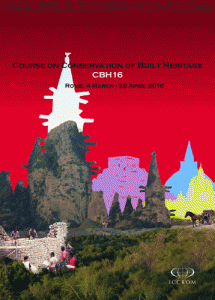 ICCROM is pleased to announce the commencement of the sixth course on Conservation of Built Heritage (CBH16) on 4 March 2016 in Rome. The course will last until 29 April 2016.
ICCROM is pleased to announce the commencement of the sixth course on Conservation of Built Heritage (CBH16) on 4 March 2016 in Rome. The course will last until 29 April 2016.
The course has been further improved based on experiences from the last five versions (CBH07, CBH09, CBH10, CBH12 and CBH14). This eight-week course intends to provide a broad understanding of both technical and management aspects of conservation and management of heritage by:
- improving understanding of critical processes in conservation so as to apply them at the macro and micro levels;
- improving strategic planning skills relevant to conservation and management of heritage;
- expanding understanding and awareness of current thinking, principles and practices in the conservation and management of built heritage.
The course is comprised of six modules:
- Module one – Issues in Heritage Conservation (General Overview), analyzing the development of conservation concepts, evolving nature of the discourse and expanding definitions of heritage;
- Module two – Management and Planning Context, discussing the management systems, planning for conservation and management of heritage;
- Module three – Information and Documentation, exploring principles, methods and tools of documentation and information management;
- Module four – Condition Assessments/Treatments (1), providing different approaches, understanding of materials and the application of science, specifically examining the effects on fabric, surfaces and structures and possible treatments and interventions;
- Module five – Condition Assessments/Treatments (2), also dealing with condition assessments and treatments at the scale of buildings, sites, archaeological sites and city centres, including various aspects of authenticity and maintenance of the cultural heritage;
- Module six – Public Access/Interpretation, looking at issues of Interpretation, Presentation, Education and Visitor Management.
Seventeen participants of diverse backgrounds (architects, archaeologists, engineers, planners etc.) representing seventeen countries will participate in the course.
As resource persons, there will be about 30 professionals from all parts of the world, who will bring their experience and skills to the course. There will also be a number of sites visits to places in and around Rome, in addition to Florence, Herculaneum and Tivoli.
In collaboration with UNESCO World Heritage Centre, the last week of the course will be dedicated to a special module on Heritage Impact Assessments. The intent is to provide current knowledge and skills in using the Heritage Impact Assessment tool for evaluating impacts from various factors affecting heritage in general, and World Heritage sites in particular.
Member States represented: Australia, Brazil, Chile, Cyprus, Egypt, India, Iran, Israel, Kenya, Mauritius, Pakistan, Peru, Poland, Sri Lanka, Turkey, United States and Zimbabwe.
SEE ALSO:
